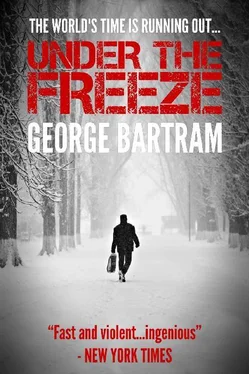“You’re a very impatient man,” she said, but the words were not spoken harshly.
“I’d want to pay for a taxi to take you home, naturally. Because of the hour.”
She named a play that she had been longing to see. “May I make a reservation for you?” he said.
“Well…”
“The stalls?”
Her voice became little-girl small. “The stalls would be quite acceptable,” she said.
“Then I’ll meet you in the stalls bar between the first and second acts. If there’s a problem with the ticket, I’ll call back; if you don’t hear from me, we’ll meet there. All right?”
“It seems all right,” she said. Some of her grander manner had been recovered.
Tarp called the theater and reserved her ticket on his Canadian credit card, and then he drove toward Carrington’s club.
Prong’s had occupied the same building for a hundred and thirty years. It had survived’a German bomb and had stood from 1942 to 1946 with two wooden props holding up its eastern wall, a situation that had led to a newspaper cartoon that showed England, as Prong’s, supported by Humour and Determination. Prong’s was an upper-civil-servants’ club, and it had had its share of prime ministers.
“Sir?” the fat porter said when he opened the door.
“I’m meeting Mr. Carrington.” Noise, smell, and heat met him in the open doorway.
“Is it Mr. Tarp, sir?”
“Yes.”
“Go right on up, sir. Third floor. Mind the stairs, they’re ever so steep.”
He had a glimpse of a former kitchen on his left, where a government figure whom he recognized was howling with laughter as he leaned against an old wall oven. Tarp could see part of a bench and the leg of a chair and several pairs of feet. The place was packed, hot, and noisy. Glasses of whiskey were much in evidence; the cigar smoke was thick.
He went up a flight of dangerous stairs and ducked his head under a black beam at the top. Prong’s was, in fact, little more than an eighteenth-century cottage. Elegance was not its attraction — the floors sloped; the ceilings were too low.
There were three doors on the third-floor landing, one to a lavatory from which a red-faced man was just stepping; one to a tiny library that was packed with grinning, shouting men; and one that was closed. He knocked lightly, then opened the door far enough to peer in.
“Aha!”
It was a billiards room hardly big enough for the billiard table. Two lights hung on cords above the green felt. Just at the edge of their brightness, a man was standing, his body in the light up to his chin and his face obscured.
“Come in, Mr. Tarp, come in.”
Tarp stepped in and closed the door. “I was looking for John Carrington.”
“We’ve met before. You don’t remember, I’m sure.”
“Of course I remember. It’s Matthiessen, isn’t it?” And the last words I said to you were , You go to hell . Tarp shook the man’s hand.
He was several inches shorter than Tarp and just slightly plump; he had slicked-back black hair that was growing thin. He was over fifty now, and since Tarp had seen him two years before the blotchy purple places under his eyes had gotten darker and the skin on this cheeks had gone from pink to maroon. Still drinking too much .
“Ramsey Matthiessen,” the man said.
“Number three at MI-Five.”
“Ah, you do remember! I consider myself highly flattered! Whatever do I do to earn such attention?” Matthiessen grinned. He considered himself a wit, one who made his subordinates laugh spontaneously and his superiors admiringly. “Been well, Mr. Tarp?”
“Pretty well.”
“You look very fit — very healthy, very brown. Is that from the sun of Florida, I wonder, or of Cuba?” He seemed to wait for an answer. He produced two cigars. “Cigar?”
“I don’t smoke.”
“Ah, yes, that American passion for good health. You don’t mind if I smoke, I hope.”
“I do mind.”
Matthiessen bared his teeth; it could hardly have been called a smile. “You say what you think, yes, I remember.” His cheeks turned to red apples as he made it a wide, false grin. “Very refreshing. I often say to the sad creatures who are forced by circumstance to work for me, Pray, don’t deceive yourselves and me with false modesty; say what you think !” He laughed. “Then if they do, of course, I have them removed. Honesty in a civil servant is the first sign of lunacy. ‘Madness in great ones must not unwatched go,’ hmm?”
“What do you want?”
“More matter, less art?”
“I have to meet Carrington.” Tarp turned to go.
“The substance of your meeting is here with me, Mr. Tarp. Not that young Carrington won’t appear. I wouldn’t deny two old friends the pleasure of each other’s company.” He smiled a perfunctory, professional smile that vanished at once. “This room is secure. The sweepers check it every day. We can talk.”
“Yes?”
Matthiessen pulled himself up straight and put a hand in the small of his back, pushing the pelvis forward as if he might be suffering from some sort of backache. “We understand you’ve gone on the Moscow rolls,” he said, lavishing a care on the vowels and the l sounds of rolls that made the words acutely sarcastic. “We understand you have sold your — shall I say, your services , and not use a more theological term — to Mr. Andropov.”
“Yes?”
Matthiessen made a clicking sound with his tongue. “How very reticent you are! Dear, dear, it’s rather like having discourse with a stone. And a rather tongue-tied stone, at that. People have pet stones in America, I understand. Come, come, do exercise the gift of speech, if only to prove that you are a sentient being, Mr. Tarp. I am only a minor figure in the great scheme of things, I realize, but Her Majesty’s government do entrust me with a certain, shall I say, responsibility, and here I am ! I have come here to talk with you. Expressly for the purpose. This is not idle chat.”
“Are you asking me a question?”
“Let us say that I am laying the groundwork.”
“For what?”
“For, let us say, something in the way of an official statement.”
“Make it.”
“I should like some indication that at the very least I am being heard.”
“I hear you.” Not entirely perfectly, because his ears were still humming with the noise of the explosion, but he could hear well enough for Matthiessen’s purpose. Matthiessen inhaled very deeply, the breath an expression of long-suffering, aristocratic patience. He walked in a very small circle, all that could be managed with the billiard table taking up so much of the room, still with his hand thrust into the small of his back. “How very annoying you are being,” he murmured when they had come face-to-face again. “No matter. Well!” He pushed his buttocks back against the billiard table and folded his arms. “Her Majesty’s government wish you to know that as you have chosen to accept a professional liaison with the government of the Soviet Union, you are not welcome in Great Britain.” He cocked an eyebrow at Tarp. “H.M.’s gov have found it necessary to formulate a policy independent of other nations. Since the unfortunate adventure by Argentina in the Falklands matter, when we didn’t receive the sort of support from traditional allies that we might have expected, we have found it advisable to, in the words of a rougher and more direct speaker than I, ‘go it alone.’ In brief, Mr. Tarp, we do not condone helping the Soviets with their internal security apparatus, which is notorious both for its inhumanity and its antipathy to English — and, I should have said, American — ideas of decency and freedom. We do not believe that the Devil will be easier to deal with if the kink is taken from his tail. Do I make myself clear?”
Читать дальше












